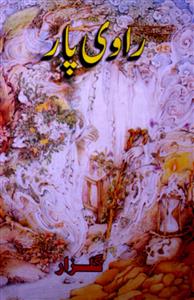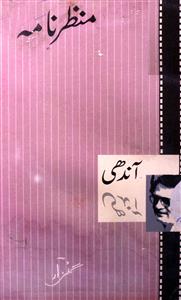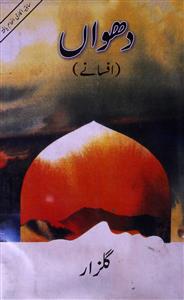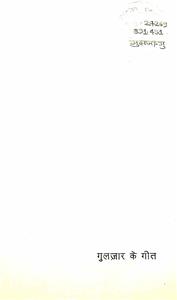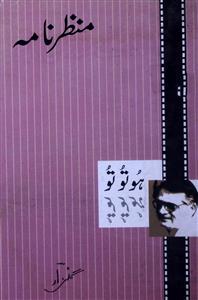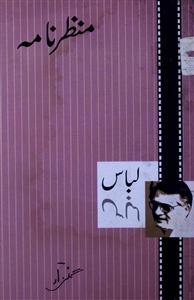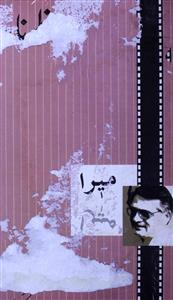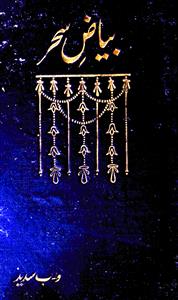 For any query/comment related to this ebook, please contact us at haidar.ali@rekhta.org
For any query/comment related to this ebook, please contact us at haidar.ali@rekhta.org
About The Book
گلزار کے افسانوں میں سماجی معنویت، مقصدیت ہے اور جدید عصری حسیت، تہذیبی فضا آفرینی بھی۔ انہیں تہذیبی روایت کا شعور بھی ہے اور تہذیبی لاشعور کا احساس بھی۔ ان کی ہر کہانی کا رنگ دوسری کہانی سے مختلف ہوتا ہے،اور ہر کہانی میں زنگی کا الگ روپ اور تجربہ سامنے آتا ہے،زیر نظر کتاب "راوی پار"ان کے افسانوں کا مجموعہ ہے میں ، اس مجموعہ میں شامل افسانے ، موضوعاتی تنوع اور اسلوبیاتی اختصاص کی وجہ سے انفرادی اہمیت کے حامل ہیں۔کتاب میں "ادّھا"،"مرد"،" راوی پار"وغیرہ ایسے افسانے ہیں جن میں زندگی کی ہمہ جہت بوقلمونیاں ہیں ۔افسانہ "مرد"ماں بیٹے کے رشتے پر ہے،اور "راوی پار"تو گلزارکا انتہائی حساس افسانہ ہے،جسے پڑھ کر رونگٹے کھڑے ہوجاتے ہیں،اس کہانی کا کردار درشن سنگھ ہے جو موجِ حوادث میں گھرا ہوا ہے۔ مسلسل حادثات نے اس سے حواس چھین لیے ہیں۔ یہ ان دنوں کی بات ہے جب ملک تقسیم ہورہا تھا، دلوں کے ٹکڑے ہورہے تھے،خون کی ندیاں بہہ رہی تھیں، خوف و ہراس، سراسیمگی کا تسلط تھا۔ پاؤں تلے سے زمینیں کھسک رہی تھیں۔ آسمانوں سے خوف کی موسلا دھار بارشیں ہورہی تھیں۔ ایسے حالات میں درشن سنگھ اپنی زمین اور اپنی جڑوں سے ہجرت پر مجبور ہوئے اور وہ بھی اپنی بیوی شاہنی کے دو نومولود جڑواں بچے کے ساتھ نکل پڑے،ٹرین کھچا کھچ بھری ہوئی ہے،تل دھرنے کی بھی جگہ نہیں ہے لیکن سفر کرنا ہے اس لیے وہ چھت پہ بیٹھ جاتے ہیں۔ ٹرین کئی نئے علاقوں سے گزرتی ہے۔ جوں جوں ہندوستان کے قریبی شہر آتے جاتے ہیں، لوگوں کے دلوں میں جوش و ولولہ بڑھتا جاتا ہے۔ اسی دوران ایک جڑواں بچے کی حرکت قلب بند ہوجاتی ہے۔ جب راوی آتا ہے تو درشن سنگھ کو مسافر دوست بچے کو راوی میں پھینک دینے کا مشورہ دیتے ہیں۔ درشن سنگھ بچے کو پھینک دیتا ہے اور پھر اپنے دوسرے بچے کی طرف پلٹتا ہے تو دیکھتا ہے کہ مردہ بچہ شاہنی کی چھاتی سے لپٹا ہوا ہے اور زندہ بچہ راوی کی لہروں میں کھوگیا ہے۔
About The Author
Poet, novelist, songwriter, film scriptwriter, playwright, producer, dialogue writer, director, intellectual, and famous for his uniqueness and innovation in every field, Gulzar has donned more hats than one. Whether in poetry or prose, his distinct expression has helped bring about ever new aspects and emotions in the journey of life. He has been presented with a long, unending series of awards and accolades for him unparalleled contribution to the field of literature and Indian film industry. To list a few, he has been conferred the Oscar, the Dada Sahib Phalke Award, Grammy Award, Filmfare Award (21 times), Indira Gandhi Award for National Solidarity, Sahitya Academy Award for Literature and Padma Bhushan, India's third highest civilian award.
Despite his immense success and fame in films, he never distanced himself from serious literature. Initially, his literary works appeared in Pakistani magazines. Ahmed Nadeem Qassimi, the editor of "Funuun", in particular patronized and guided the young poet. Later, Gulzar acknowledged him as his "Baba", or fatherly figure.
Gulzar, whose real name is Sampuran Singh Kalra, was born on August 18, 1934, in the village of Dina in the Jhelum district of undivided India. His father's name was Makhan Singh, who ran a small business. Gulzar's mother died when he was a suckling child and his stepmother did not treat him well. Therefore, Gulzar spent most of his time at his father's shop. He was not much interested in textbooks and failed in intermediate but found his calling in literature. From his boyhood, he was deeply attached Rabindranath Tagore and Sharat Chand, who were his favorite writers.
Gulzar's family survived the horrors of the partition of the country in 1947 and set up camp first in Amritsar and then in Delhi. In Delhi, they lived in the Sabzi Mandi area. Makhan Singh was unable to afford Gulzar's education. So, his son had to work at a petrol pump. Then a few days later fate took him to Bombay. Gulzar had a dream to become a poet and poetry was his real love. After coming to Bombay, Gulzar entered the literary circles. Increasing his influence, he regularly attended meetings of the Association of Progressive Writers. In this way, he developed relationships with a number of writers, including Shailendar, a well-known film singer at the time. In the early 1960s. Famous filmmaker Bimal Roy was making "Bandani" with music director SD Burman and lyricist Shailendar. Coincidentally, the composer-songwriter duo fell apart and parted ways. Shailendar asked Gulzar to meet Bimal Roy to write a song for the film. Bimal Rai understood the situation and after initial reflection, assigned Gulzar to write a song. Gulzar thus wrote his first song "Mora Gora Ang Liye Le Mohe Shyam Rang Dei De" which was very much liked by SD Burman and Bimal Roy and later became a very popular number. It was Gulzar's only song in the film as Shelander and SD Burman were later reconciled. However, Bimal Roy did not like the idea of a talented young man working in a motor garage, so he insisted on Gulzar quitting his job and becoming his assistant.
While Gulzar was working as Bimal Roy's assistant, he came across Meena Kumari. She was the heroine of Bimal Roy's film Benazir. Gradually, their acquaintance reached a point what was then called a ‘relationship’. However, the relationship was such that when Meena Kumari was ill, Gulzar would come to her house on time to give her medicine, and when Meena Kumari refused to take medicine during the day in Ramadan, Gulzar told her that she is not obliged to fast due to illness. Instead, Gulzar fasted on her part. It is said that Gulzar continued to fast in Ramadan even after the death of Meena Kumari. On the other hand, Meena Kumari inherited her eloquence from Gulzar and handed over her diaries and copies on which her ghazals and poems were written to Gulzar. They were later edited and published by Gulzar. Meena Kumari played the lead role in Gulzar's first film "Mere Apne".
After the death of Meena Kumari, on May 15, 1973, Gulzar married Rakhi, whose career as a heroine was at its peak. From this marriage, his only daughter is Meghna Gulzar, who is now a well-known director. Shortly after the birth of Meghna alias Boski, Gulzar and Rakhi separated but never divorced.
Along with his long film career, Gulzar has also been setting new milestones in the field of literature. He also gave it new lease of life with his innovation. For some time now, he has been seriously interested in children's poetry and prose. His title song for "Jungle Book", ‘Jungle Jungle baat chali hai pata chala hai, chaddi pahan ke phool khila hai phool khila hai’.
He has also written poems and dialogues for "Alice in Wonderland" and "Potli Baba". He is also the founder of Aarushi, an organization for physically challenged children, and Eklavya, an NGO working for education. In April 2013, he was appointed Chancellor of Assam University.
The fame and honor that Gulzar has attained in his lifetime is something that very few people are vouchsafed with. However, a writer’s literary merit is always assessed by the readers of coming ages, and not contemporary times.
 For any query/comment related to this ebook, please contact us at haidar.ali@rekhta.org
For any query/comment related to this ebook, please contact us at haidar.ali@rekhta.org
